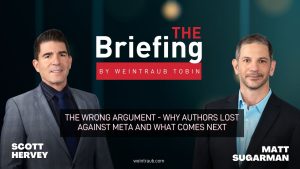
 The Briefing by Weintraub Tobin
The Briefing by Weintraub Tobin The Wrong Argument – Why Authors Lost Against Meta and What Comes Next
Jul 25, 2025
A recent court ruling favored Meta against authors claiming misuse of their works for AI training. The discussion highlights crucial aspects of the fair use doctrine and its implications for future copyright litigation. Key factors include market harm and strategic adaptations needed by AI developers to avoid legal pitfalls. The podcast also examines past cases to forecast how artists can better prepare for potential disputes. It’s a revealing look into the evolving intersection of AI technologies and copyright law.
AI Snips
Chapters
Transcript
Episode notes
Authors Sued Meta Over Pirated Books
- Thirteen prominent authors sued Meta, alleging it trained its LLaMA model using pirated copies of their books.
- Meta knowingly used unauthorized copies from shadow libraries like LibGen and Anna's Archive to train its models.
Transformative AI Use Found Valid
- The court found Meta's use highly transformative since LLaMA generates new content rather than substituting original books.
- The model could only reproduce small snippets, far below prior tolerated amounts in fair use cases.
Nature of Works Favors Plaintiffs
- The nature of the copyrighted works weighed in favor of plaintiffs, as books are creative works.
- Nonetheless, this factor is usually weak especially for published material.

 In a major win for Meta, a federal court recently dismissed a lawsuit brought by prominent authors who claimed their books were illegally used to train the company’s LLaMA models. But the ruling doesn’t give AI companies a free pass—it reveals the roadmap for how a better-prepared copyright plaintiff could win next time.
In a major win for Meta, a federal court recently dismissed a lawsuit brought by prominent authors who claimed their books were illegally used to train the company’s LLaMA models. But the ruling doesn’t give AI companies a free pass—it reveals the roadmap for how a better-prepared copyright plaintiff could win next time.